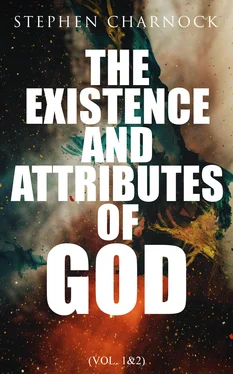Stephen Charnock - The Existence and Attributes of God (Vol. 1&2)
Здесь есть возможность читать онлайн «Stephen Charnock - The Existence and Attributes of God (Vol. 1&2)» — ознакомительный отрывок электронной книги совершенно бесплатно, а после прочтения отрывка купить полную версию. В некоторых случаях можно слушать аудио, скачать через торрент в формате fb2 и присутствует краткое содержание. Жанр: unrecognised, на английском языке. Описание произведения, (предисловие) а так же отзывы посетителей доступны на портале библиотеки ЛибКат.
- Название:The Existence and Attributes of God (Vol. 1&2)
- Автор:
- Жанр:
- Год:неизвестен
- ISBN:нет данных
- Рейтинг книги:3 / 5. Голосов: 1
-
Избранное:Добавить в избранное
- Отзывы:
-
Ваша оценка:
- 60
- 1
- 2
- 3
- 4
- 5
The Existence and Attributes of God (Vol. 1&2): краткое содержание, описание и аннотация
Предлагаем к чтению аннотацию, описание, краткое содержание или предисловие (зависит от того, что написал сам автор книги «The Existence and Attributes of God (Vol. 1&2)»). Если вы не нашли необходимую информацию о книге — напишите в комментариях, мы постараемся отыскать её.
The Existence and Attributes of God (Vol. 1&2) — читать онлайн ознакомительный отрывок
Ниже представлен текст книги, разбитый по страницам. Система сохранения места последней прочитанной страницы, позволяет с удобством читать онлайн бесплатно книгу «The Existence and Attributes of God (Vol. 1&2)», без необходимости каждый раз заново искать на чём Вы остановились. Поставьте закладку, и сможете в любой момент перейти на страницу, на которой закончили чтение.
Интервал:
Закладка:
(2.) Subserviency of the lower world, the earth, and sea, which was created to be inhabited, (Isa. xlv. 18). The sea affords water to the rivers, the rivers, like so many veins, are spread through the whole body of the earth, to refresh and enable it to bring forth fruit for the sustenance of man and beast, (Ps. civ. 10, 11). “He sends the springs into the valleys, which run among the hills; they give drink to every beast of the field; the wild asses quench their thirst. He causes the grass to grow for the cattle, and the herb for the service of man, that he may bring forth food out of the earth.” (ver. 14.) The trees are provided for shades against the extremity of heat, a refuge for the panting beasts, an “habitation for birds,” wherein to make their nests (ver. 17), and a basket for their provision. How are the valleys and mountains of the earth disposed for the pleasure and profit of man! Every year are the fields covered with harvests for the nourishing the creatures; no part is barren, but beneficial to man. The mountains that are not clothed with grass for his food, are set with stones to make him an habitation; they have their peculiar services of metals and minerals, for the conveniency and comfort, and benefit of man. Things which are not fit for his food, are medicines for his cure, under some painful sickness. Where the earth brings not forth corn, it brings forth roots for the service of other creatures. Wood abounds more in those countries where the cold is stronger than in others. Can this be the result of chance, or not rather of an Infinite Wisdom? Consider the usefulness of the sea, for the supply of rivers to refresh the earth: “Which go up by the mountains and down by the valleys into the place God hath founded for them” (Ps. civ. 8): a store‑house for fish, for the nourishment of other creatures, a shop of medicines for cure, and pearls for ornament: the band that ties remote nations together, by giving opportunity of passage to, and commerce with, one another. How should that natural inclination of the sea to cover the earth, submit to this subserviency to the creatures? Who hath pounded in this fluid mass of water in certain limits, and confined it to its own channel, for the accommodation of such creatures, who, by its common law, can only be upon the earth? Naturally the earth was covered with the deep as with a garment; the waters stood above the mountains. “Who set a bound that they might not pass over,” 75that they return not again to cover the earth? Was it blind chance or an Infinite Power, that “shut up the sea with doors, and made thick darkness a swaddling band for it, and said, Hitherto shall thou come and no farther, and here shall thy proud waves be stayed?” 76All things are so ordered, that they are not propter se , but propter aliud . What advantage accrues to the sun by its unwearied rolling about the world? Doth it increase the perfection of its nature by all its circuits? No; but it serves the inferior world, it impregnates things by its heat. Not the most abject thing but hath its end and use. There is a straight connection: the earth could not bring forth fruit without the heavens; the heavens could not water the earth without vapors from it.
(3.) All this subserviency of creatures centres in man. Other creatures are served by those things, as well as ourselves, and they are provided for their nourishment and refreshment, as well as ours; 77yet, both they, and all creatures meet in man, as lines in their centres. Things that have no life or sense, are made for those that have both life and sense; and those that have life and sense, are made for those that are endued with reason. When the Psalmist admiringly considers the heavens, moon and stars, he intimates man to be the end for which they were created (Ps. viii. 3, 4): “What is man, that thou art mindful of him?” He expresseth more particularly the dominion that man hath “over the beasts of the field, the fowl of the air, and whatsoever passes through the paths of the sea” (ver. 6–8); and concludes from thence, the “excellency of God’s name in all the earth.” All things in the world, one way or other, centre in an usefulness for man; some to feed him, some to clothe him, some to delight him, others to instruct him, some to exercise his wit, and others his strength. Since man did not make them, he did not also order them for his own use. If they conspire to serve him who never made them, they direct man to acknowledge another, who is the joint Creator both of the lord and the servants under his dominion; and, therefore, as the inferior natures are ordered by an invisible hand for the good of man, so the nature of man is, by the same hand, ordered to acknowledge the existence and the glory of the Creator of him. This visible order man knows he did not constitute; he did not settle those creatures in subserviency to himself; they were placed in that order before he had any acquaintance with them, or existence of himself; which is a question God puts to Job, to consider of (Job xxxviii. 4): “Where wast thou when I laid the foundation of the earth? declare, if thou hast understanding.” All is ordered for man’s use; the heavens answer to the earth, as a roof to a floor, both composing a delightful habitation for man; vapors ascend from the earth, and the heaven concocts them, and returns them back in welcome showers for the supplying of the earth. 78The light of the sun descends to beautify the earth, and employs its heat to midwife its fruits, and this for the good of the community, whereof man is the head; and though all creatures have distinct natures, and must act for particular ends, according to the law of their creation, yet there is a joint combination for the good of the whole, as the common end; just as all the rivers in the world, from what part soever they come, whether north or south, fall into the sea, for the supply of that mass of waters, which loudly proclaims some infinitely wise nature, who made those things in so exact an harmony. “As in a clock, the hammer which strikes the bell leads us to the next wheel, that to another, the little wheel to a greater, whence it derives its motion, this at last to the spring, which acquaints us that there was some artist that framed them in this subordination to one another for this orderly motion.” 79
(4.) This order or subserviency is regular and uniform; everything is determined to its particular nature. 80The sun and moon make day and night, months and years, determine the seasons, never are defective in coming back to their station and place; they wander not from their roads, shock not against one another, nor hinder one another in the functions assigned them. From a small grain or seed, a tree springs, with body, root, bark, leaves, fruit of the same shape, figure, smell, taste; that there should be as many parts in one, as in all of the same kind, and no more; and that in the womb of a sensitive creature should be formed one of the same kind, with all the due members, and no more; and the creature that produceth it knows not how it is formed, or how it is perfected. If we say this is nature, this nature is an intelligent being; if not, how can it direct all causes to such uniform ends? if it be intelligent, this nature must be the same we call God, “who ordered every herb to yield seed, and every fruit tree to yield fruit after its kind, and also every beast, and every creeping thing after its kind.” (Gen. i. 11, 12, 24.) And everything is determined to its particular season; the sap riseth from the root at its appointed time, enlivening and clothing the branches with a new garment at such a time of the sun’s returning, not wholly hindered by any accidental coldness of the weather, it being often colder at its return, than it was at the sun’s departure. All things have their seasons of flourishing, budding, blossoming, bringing forth fruit; they ripen in their seasons, cast their leaves at the same time, throw off their old clothes, and in the spring appear with new garments, but still in the same fashion. The winds and the rain have their seasons, and seem to be administered by laws for the profit of man. 81No satisfactory cause of those things can be ascribed to the earth, the sea, or the air, or stars. “Can any understand the spreading of his clouds, or the noise of his tabernacle?” (Job xxxviii. 29). The natural reason of those things cannot be demonstrated, without recourse to an infinite and intelligent being; nothing can be rendered capable of the direction of those things but a God.
Читать дальшеИнтервал:
Закладка:
Похожие книги на «The Existence and Attributes of God (Vol. 1&2)»
Представляем Вашему вниманию похожие книги на «The Existence and Attributes of God (Vol. 1&2)» списком для выбора. Мы отобрали схожую по названию и смыслу литературу в надежде предоставить читателям больше вариантов отыскать новые, интересные, ещё непрочитанные произведения.
Обсуждение, отзывы о книге «The Existence and Attributes of God (Vol. 1&2)» и просто собственные мнения читателей. Оставьте ваши комментарии, напишите, что Вы думаете о произведении, его смысле или главных героях. Укажите что конкретно понравилось, а что нет, и почему Вы так считаете.












